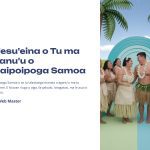 Samoan weddings are a vibrant blend of rich traditions and contemporary influences, creating a unique and heartfelt celebration. Rooted in strong family values and cultural heritage, these ceremonies emphasize respect, unity, and community involvement. From the intricate tatau (tattoo) symbols to the lavalava (traditional garments), every aspect of a Samoan wedding reflects deep cultural significance. In recent years, while Western elements like white gowns and formal venues have been incorporated, the essence of Samoan customs remains at the heart of every union.
Samoan weddings are a vibrant blend of rich traditions and contemporary influences, creating a unique and heartfelt celebration. Rooted in strong family values and cultural heritage, these ceremonies emphasize respect, unity, and community involvement. From the intricate tatau (tattoo) symbols to the lavalava (traditional garments), every aspect of a Samoan wedding reflects deep cultural significance. In recent years, while Western elements like white gowns and formal venues have been incorporated, the essence of Samoan customs remains at the heart of every union.

The Importance of Family in Samoan Weddings
Family is the cornerstone of Samoan weddings, playing a crucial role in every stage of the celebration. Unlike Western weddings, where the focus is mainly on the couple, Samoan weddings emphasize the union of two families rather than just two individuals. The elders and extended family members are deeply involved in decision-making, ensuring that traditions are honored.
A key aspect of this is the fa’a Samoa (the Samoan way), which dictates that family obligations come before personal desires. This means that wedding expenses are often shared among relatives, reducing financial strain on the couple. Moreover, the wedding serves as a time for both families to strengthen their bonds, creating lifelong connections that extend beyond the bride and groom.
Traditional Samoan Wedding Attire and Symbolism
Samoan wedding attire is a beautiful representation of culture and tradition. The bride and groom typically wear lavalava (a wrap-around skirt), adorned with intricate patterns and bright colors symbolizing prosperity and happiness. Some couples incorporate Western-style wedding dresses and suits, but traditional elements are still present.
One of the most significant symbols in a Samoan wedding is the tapa cloth, a hand-painted fabric made from mulberry bark. This cloth is often used as a decorative element at the wedding venue and gifted to the couple as a symbol of wealth and status. Additionally, ula leis (flower garlands) are worn to signify love and beauty, adding a natural elegance to the celebration.

 The Role of Chiefs and Community in the Ceremony
The Role of Chiefs and Community in the Ceremony
Samoan weddings are deeply connected to the matai system, where village chiefs play an integral role in the wedding proceedings. The matai, or chief, often gives blessings and ensures that traditions are followed correctly. Their presence not only adds formality to the event but also reinforces the importance of hierarchy and respect within Samoan society.
The ceremony itself includes traditional blessings, speeches, and cultural performances. One of the most iconic aspects of a Samoan wedding is the siva (traditional dance), where the bride and groom, along with family members, showcase their gratitude and joy through expressive movements. These dances are often accompanied by live drumming and singing, creating an unforgettable atmosphere.

Gift-Giving Customs in Samoan Weddings
Gift-giving is a fundamental part of Samoan weddings, symbolizing generosity and goodwill. Instead of conventional wedding gifts like household items, guests often present the couple with fine mats (ie toga), tapa cloths, and monetary contributions. These gifts are considered valuable assets and are often used to strengthen social and familial ties.
Another unique tradition is the fa’alavelave, where extended family members contribute financially or materially to support the wedding expenses. This collective effort reinforces the communal nature of Samoan society, ensuring that no individual bears the financial burden alone. The practice also highlights the concept of reciprocity, as families who give generously often receive similar support in the future.

The Feast: A Grand Celebration of Food and Hospitality
No Samoan wedding is complete without an extravagant feast. Food plays a central role in the festivities, reflecting the island’s deep sense of hospitality and abundance. Traditional dishes served at a Samoan wedding include:
- Oka (raw fish marinated in coconut cream)
- Palusami (taro leaves cooked in coconut milk)
- Umukuka (roast pig cooked in an underground oven)
- Fa’ausi (sweet coconut dessert)
The wedding feast is not just about indulging in delicious food—it is also a way to honor guests and show appreciation for their presence. The abundance of food signifies prosperity and blessings for the newlyweds as they embark on their journey together.

Modern Trends in Samoan Weddings
While traditional customs remain deeply ingrained in Samoan weddings, modern trends have started to influence these celebrations. Today, many couples opt for a combination of Western and Samoan elements, such as:
- Destination weddings at beach resorts
- Western-style wedding dresses with traditional lavalava accessories
- Smaller, intimate ceremonies rather than large community gatherings
- Professional photography and videography to capture memories
Despite these modern touches, the essence of Samoan culture—family, respect, and communal support—continues to define wedding celebrations in Samoa. This blend of old and new ensures that Samoan weddings remain deeply meaningful and cherished.
*Capturing unauthorized images is prohibited*


